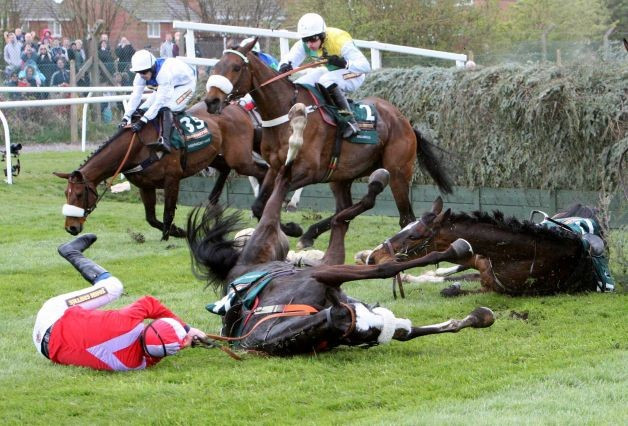Horsemeat Crisis: Was Gold Cup Winner Syncronised Made into Lasagne?

Doomed Grand National runners were taken from Aintree racecourse to an abattoir which has now been suspended because of the horsemeat scandal.
Peter Boddy Slaughterhouse in Todmorden, West Yorkshire, was closed down by the Food Standards Agency (FSA) as part of investigations into the growing scandal.
Officials at Aintree racecourse confirmed that fatally injured horses were taken away by the abattoir on Boddy's East Hey Head Farm.
Cheltenham Gold Cup winner Synchronised was one of two horses destroyed after falling at the 2012 Grand National.
Boddy said that the story was "totally wrong" but has not commented further.
Meat from racehorses is banned from the human food chain because of chemicals in the horse flesh from painkillers such as "bute" (phenylbutazone), which is potentially hazardous to humans.
Farmbox Meats in Aberystwyth, Wales, a processing plant which was supplied by the slaughterhouse, was also raided by government officials and had operations halted.
The owner of Farmbox Meats invited journalists to witness operations at the plant to quell worries over the food's safety. Officials from the FSA raided the plant on the same day as reporters were given a tour.
Racing industry precautions
An Aintree spokesman said it took measures to comply with the law forbidding racehorses that had been put down from entering the food chain.
"The racing industry takes every possible course of action to ensure horses fatally injured on a racecourse cannot enter the food chain," he said.
"We are confident no unfit meat reaches the human food chain."
Lasagna produced by Findus was found to contain 100 percent horsemeat.
The horsemeat crisis has spread to Germany, with tests revealing the material in frozen lasagne produced by TiP. Supermarket chain The Real pulled the product from its shelves in response to growing public worry.
But horsemeat is an established part of diets in many other EU countries, including France and Italy.
Public confidence in big retailers has been shaken by the scandal, with customers turning their backs on processed meat in favour of fresh cuts, say industry experts.
Trade at butcher shops has jumped 20 percent since the crisis began, according to trade body Q Guild.
The Association of Independent Meat Suppliers said British unprocessed beef sales could surge as a result.
Q Guild spokesman Brindon Addy said: "Some people are wising up. If they buy a sausage worth tuppence, they've got to wonder what's going into it. Horesemeat would probably be one of the better things to find in it."
© Copyright IBTimes 2025. All rights reserved.




















